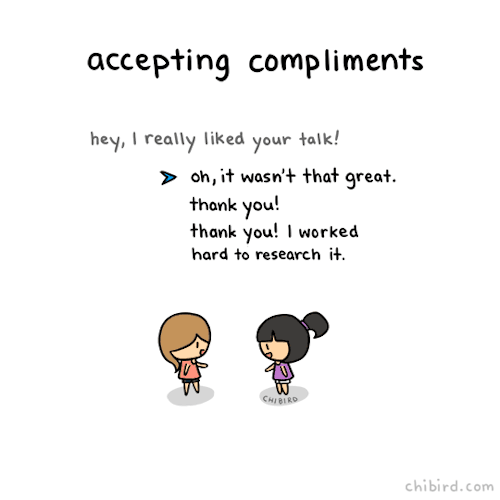At the start of my career, my thinking was way too black-and-white.
Someone would tell me, “Be less polite with your emails”, and I’d translate that to “the blunter the email the better.” Then I’d get grumpy replies from seniors and wonder what I was doing wrong. facepalm
Really, I could’ve used Aristotle’s advice:
That virtue is found in the ‘golden mean’ between two opposing vices - a lack, and an excess.
Courage, for example, is the sweet spot between cowardice (too little) and recklessness (too much).
And this principle applies to so many aspects of our careers, including confidence - something a lot of us struggle with.
We often find ourselves either being a doormat (lack of confidence) or thinking we're The Chosen One (excess) to the point that co-workers can’t stand us.
In between, there’s a level of confidence that’s universally respected and admired, and makes the world of work a whole lot easier.

So, today, I’m gonna break down a few habits, and show you how to navigate this tricky middle path.
😞 Apologies
Doormat: You spilled my drink? Oh my gosh, I’m so sorry!
Arrogant: Apologize? What’s an apology?
Confident: Apologizes sincerely when something’s their fault. Or replace sorry with thank you: i.e. "Thanks for your patience" instead of “Sorry I couldn’t get back to you sooner.”
If you’re saying sorry all the time, for every little thing, stop. It undermines your authority and makes you appear less confident.
Likewise, if you never hold your hand up and say “my bad”, your team’s morale won’t last long.
=> Get into the habit of only saying sorry when you mean it. Think sometimes, not all the time.

🧩 Contributing ideas
Doormat: Nobody would like my idea.
Arrogant: It’s my way or the highway.
Confident: I think X would work, but let’s hear what everyone else thinks.
We’ve all been in a brainstorming session with people who love the sound of their own voice. Unfortunately, these people have some of the worst ideas.
If you’re quiet, make a real effort to contribute to meetings. Preface with: "I have a thought" or "Can I add something?"
If you don’t have anything good, ask questions instead to move the discussion forward.
👏 Receiving compliments
Doormat: You like it? Well it was no big deal.
Arrogant: My work’s amazing, I know.
Confident: Thanks! Appreciate it!
It’s amazing the number of people who just can’t take a compliment (me included). If you instinctively brush them off, let a compliment land for once. Thank the other person, and tell them you appreciate it.
It might sound weird, but it’ll make the other person feel good too.

🎯 Being more direct when asking for help
Doormat: “I know how busy you are, but...”, “I hate to bother you...”, or "It would be great if you could..."
Arrogant: Where’s the spreadsheet? I shouldn’t have to ask you for it.
Confident: "Can you update the spreadsheet please?"
When you're asking someone for a favor, it's easy to be overly polite and apologetic. Instead, be direct with your asks and don't assume you're creating a burden on someone.

It's a sign of confidence to not beat around the bush.
🧩 Embracing vulnerability
Doormat: I'm an impostor. If they find out, I'm toast.
Arrogant: Flaws? I don't have flaws. I'm practically perfect.
Confident: Everyone’s got impostor syndrome (including my boss). Admitting weaknesses shows strength and builds trust. We're all human.
The most confident people readily own up to mistakes and knowledge gaps.

🤦♂️ Self-criticism
Doormat: I can’t do anything right.
Arrogant: The sun shines out of my rear end.
Confident: There’s things I’m not great at, but everyone’s a work in progress. No need to beat myself up over it.
If you’re too self-critical, you’re holding yourself back. Your mind should be a coach, not your enemy. Train yourself to see your wins by keeping a “brag folder” or gratitude journal (also helps with impostor syndrome too — personally, I save the nice replies in a separate folder in my email, and look at them whenever I feel like I’m not doing good enough).
🤕 Failure
Doormat: I think I should just quit.
Arrogant: I didn’t fail, and even if it didn’t work, it was someone else’s fault.
Confident: It didn’t work out, but that’s just part of the game. Learn the lesson, and move on.
To succeed, you have to fail - that’s how it works. If you beat yourself up for failing, how can you get anywhere? (You can’t.)

🙅 Saying no
Doormat: Work at the weekend for no pay? Ummm, I guess. (lose-win)
Arrogant: Who cares if the other party loses? (win-lose)
Confident: I can’t agree to anything that’s going to be high friction long-term. Let’s find something that works for everyone now rather than complain later. (win-win)
If you struggle to say no, see this LinkedIn post I made recently — and follow me there so you don’t miss my bite-sized career strategy through your week. It’s an easy way to make sure you win in your career.

So, which of these habits do you need to work on most?
I'm guessing at least one of them made you go, "Yep, that's me."
Reply and let me know with a number from 1 through to 8 (or more than one):
- Apologies
- Contributing ideas
- Receiving compliments
- Being more direct
- Embracing vulnerability
- Self-criticism
- Failure
- Saying no
I'll pick the most popular ones and break them down further in an upcoming email or LinkedIn post.


